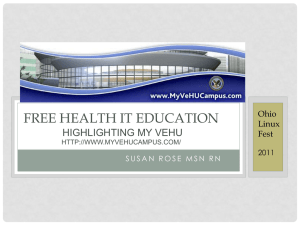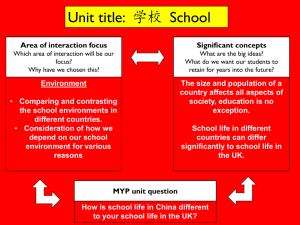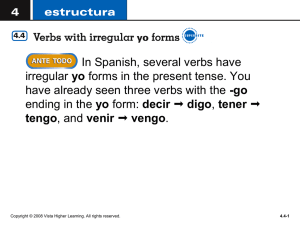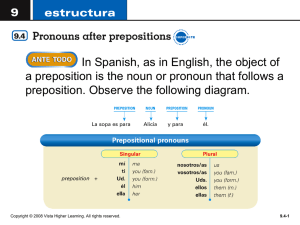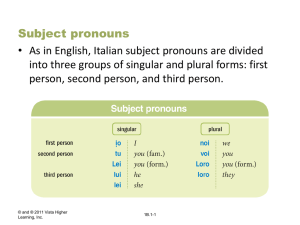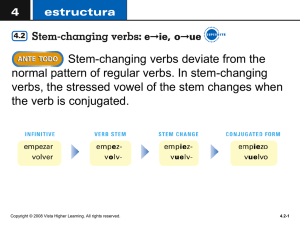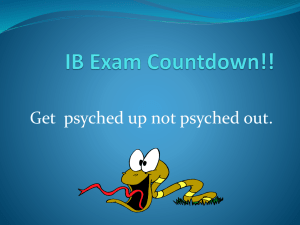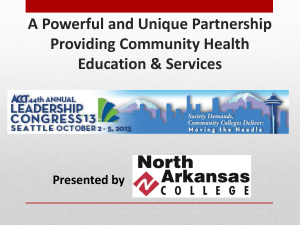A Sample Community Organization AmeriCorps*VISTA
advertisement
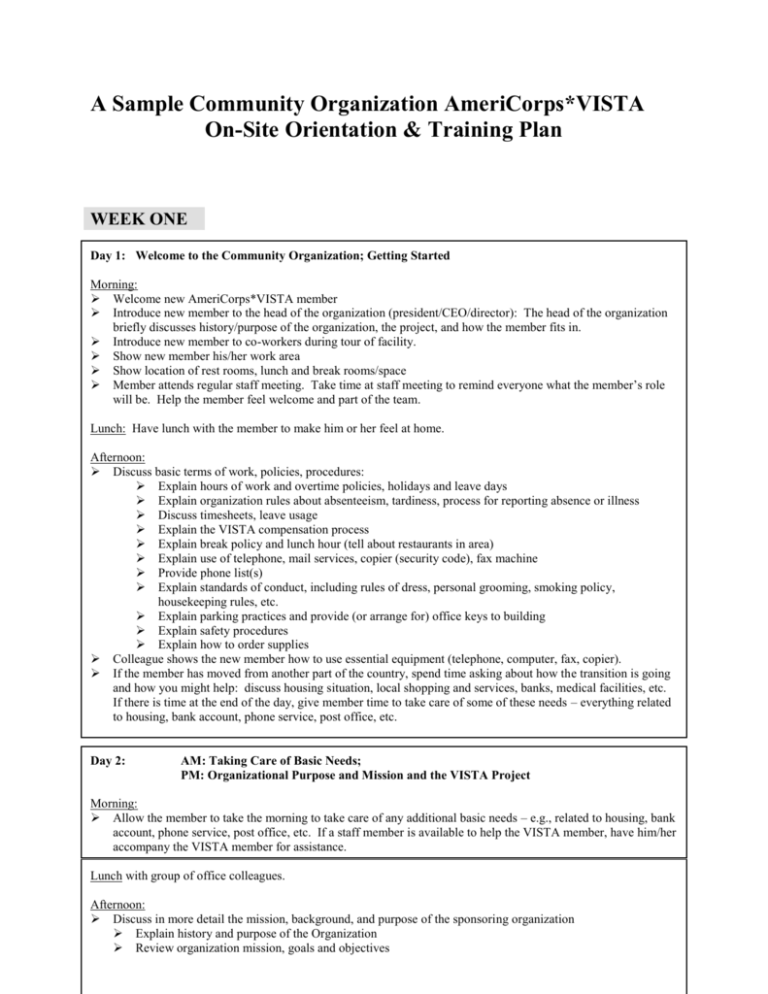
A Sample Community Organization AmeriCorps*VISTA On-Site Orientation & Training Plan WEEK ONE Day 1: Welcome to the Community Organization; Getting Started Morning: Welcome new AmeriCorps*VISTA member Introduce new member to the head of the organization (president/CEO/director): The head of the organization briefly discusses history/purpose of the organization, the project, and how the member fits in. Introduce new member to co-workers during tour of facility. Show new member his/her work area Show location of rest rooms, lunch and break rooms/space Member attends regular staff meeting. Take time at staff meeting to remind everyone what the member’s role will be. Help the member feel welcome and part of the team. Lunch: Have lunch with the member to make him or her feel at home. Afternoon: Discuss basic terms of work, policies, procedures: Explain hours of work and overtime policies, holidays and leave days Explain organization rules about absenteeism, tardiness, process for reporting absence or illness Discuss timesheets, leave usage Explain the VISTA compensation process Explain break policy and lunch hour (tell about restaurants in area) Explain use of telephone, mail services, copier (security code), fax machine Provide phone list(s) Explain standards of conduct, including rules of dress, personal grooming, smoking policy, housekeeping rules, etc. Explain parking practices and provide (or arrange for) office keys to building Explain safety procedures Explain how to order supplies Colleague shows the new member how to use essential equipment (telephone, computer, fax, copier). If the member has moved from another part of the country, spend time asking about how the transition is going and how you might help: discuss housing situation, local shopping and services, banks, medical facilities, etc. If there is time at the end of the day, give member time to take care of some of these needs – everything related to housing, bank account, phone service, post office, etc. Day 2: AM: Taking Care of Basic Needs; PM: Organizational Purpose and Mission and the VISTA Project Morning: Allow the member to take the morning to take care of any additional basic needs – e.g., related to housing, bank account, phone service, post office, etc. If a staff member is available to help the VISTA member, have him/her accompany the VISTA member for assistance. Lunch with group of office colleagues. Afternoon: Discuss in more detail the mission, background, and purpose of the sponsoring organization Explain history and purpose of the Organization Review organization mission, goals and objectives Review organization structure Provide copy of organization chart and review staff duties Explain departmental and divisional functions, goals, teams and team structure, major projects Purpose of the VISTA project Explain the purpose of the VISTA project and role of the members Explain goals and objectives of project Review past work of project if in year 2 or 3 Give the member time to read any materials presented to him/her. At the end of the day, do a ½ hour check in to answer any questions the member may have come up with about the organization or project. Tell member that tomorrow you will be going over the project plan in more detail. Day 3: The Member Assignment, Supervisory Relationship, and Community Investigation. Morning: Clarification of individual project plan(s), how goals will be achieved, and how the VISTA member’s progress in achieving project plan objectives will be assessed Review the individual project plan/job description, explain specific responsibilities Important: Make it clear what the outcomes of the project are: what permanent infrastructure will the member help create and how will that help individuals or communities move out of poverty. Explain performance reviews (date for first review, frequency thereafter) Provide copy of performance standards Discuss performance expectations and standards and reporting requirements Discuss specific performance objectives which will be reviewed during the initial period. Supervisory and support structure; communications; reporting; accountability Discuss the working relationship between the member and direct supervisor, mutual expectations, communications style, work style, support needs, etc. Discuss and clarify communication procedures and practices Review staff meeting and team meeting schedules Present copy of Employee Manual and have each member sign a form to acknowledge receipt of the handbook and intention to become familiar with its contents Explain steps in discipline procedure (verbal warning, written warning, etc.) and specify actions that would result in disciplinary action. End on a positive affirming note about how excited you are to have the member working on this project. Have the member interview other staff about work styles, communications, etc. Afternoon: Independent Community Investigation: The member spends afternoon exploring community and making a mental inventory of assets, needs and cultural practices. Brief the member before he/she heads out into the community about where to go, what to look for, and how to ensure his or her safety. Explain that the member will be reviewing his or her observations with an expert on the community the following morning. Day 4: Deepening the Understanding the Community and the Project. Morning: The member spends the morning with someone who is very knowledgeable about the community and discusses his or her observations from the previous day. This community “expert” provides a background on the community during a more guided tour than the member’s previous day’s meanderings. The community “expert” explains the nature of the low-income population served by the VISTA project. The community “expert” introduces the member to community leaders, especially those involved in the VISTA project Discuss cultural norms, do’s and don’ts, social outlets to enjoy and those to stay away from, etc. Afternoon: Have the member spend the afternoon with one or more partner organizations or other members and AmeriCorps State/National members involved in this project or related projects. 2 Have the member gather as much information as possible to help him/her understand the community and the project. Day 5: Reflection; Team Building; Celebration of the First Week. Morning: Discuss impressions and findings from Day 4 with supervisor. Discuss implications these have for the project and the member’s project plan. Discuss potential resources that can be applied to help achieve project goals: Review use of volunteers on the VISTA project Meet with recruitment representatives from Volunteer Center, RSVP Review barriers and successes to volunteer use of resources discussed. How member can best help volunteers and others involved in the project Discuss support/recognition; helping volunteers to feel valued; ways to recognize Afternoon: Team Building activity with staff, other members, project collaborators, other AmeriCorps Members, etc. Evening: Potluck dinner with office staff, other members, AmeriCorps members, Senior Corps members and VISTA alumni. Celebration of the first week of the member’s assignment! WEEK TWO Day 1: Skill Development: Shadowing Staff of sponsor organization Morning and Afternoon: The member accompanies staff member for the whole day out of the office – conducting community interviews, recruiting volunteer participation in project, managing volunteers on project, etc. Day 2: Skill Development: Shadowing Staff of another organization involved in similar work. Morning and Afternoon: The member accompanies staff member of another organization involved in similar or complementary efforts for the whole day – conducting community interviews, recruiting volunteer participation in project, managing volunteers on project etc. Day 3: Reflection and Collaboration/Informational Interviews Morning: The member meets with supervisor to discuss previous days’ shadow activities and to reflect on community interviews, recruiting volunteer participation in project, managing volunteers on project etc. Discussion of additional training the member needs to carry out assignment. The member begins contacting community/organizational leaders with whom the member will be collaborating on the project to set up informational interviews, beginning this afternoon. Afternoon: Informational/collaboration interview 1 Day 4: Informational/Collaboration Interviews (Continued) 3 Morning: Informational/collaboration interview 2 Informational/collaboration interview 3 Afternoon: Discussion with supervisor and other sponsor organization staff about conclusions from informational/collaboration interviews. What implications can be drawn related to the project? What recommendations and cautions do the supervisor and other staff have about those conclusions? The member spends the rest of the day drafting a one-month, detailed project plan – with clear and detailed activities defined. The member drafts a month-long plan and review with the supervisor at the end of the day. Day 5: Skill Development: Computer Skills Morning and Afternoon The member spends day with local Teaming for Tech computer specialist learning or refining computer skills the member will need (e.g., Microsoft Word, Excel, Publisher, Access) for producing flyers, pamphlets and posters; writing grant proposals; building or using contact databases; etc. WEEK THREE The VISTA member begins independent implementation of project with frequent check-in sessions with supervisor and other key organization staff to see how the work is going. Supervisor makes it clear to the member that this third week is still a period of learning, practice, testing, and adapting. He or she should not worry about making mistakes, asking lots of questions, and experimenting. Additional skill training is set up for the member as needed: For example, the member could participate in a public speaking class offered by the community continuing education program; learn from an experienced staff member the key components of a quality grant proposal; or spend an afternoon with someone from the credit union to learn about the management of low-income loan programs, interest rates and starting a small business. 4
